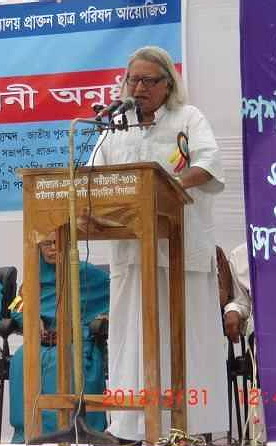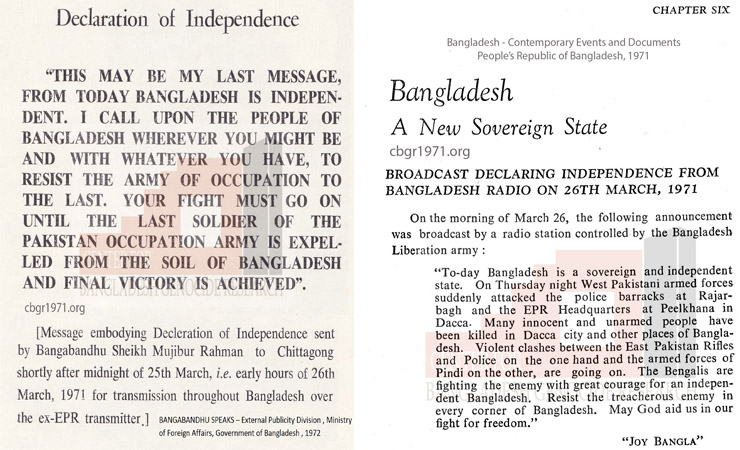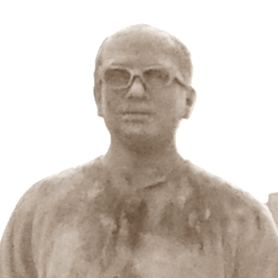|
Mujib Nagar Sarkar
The Provisional Government of Bangladesh (), popularly known as the Mujibnagar Government (); also known as the Bangladeshi government-in-exile, was the first and founding government of Bangladesh that was established following the proclamation of independence of East Pakistan as Bangladesh on 10 April 1971. Headed by prime minister Tajuddin Ahmad, it was the supreme leadership of the Bangladeshi liberation movement, comprising a cabinet, a diplomatic corps, an assembly, an armed force, and a radio service. It operated as a government-in-exile from Kolkata. The president of this government was Sheikh Mujibur Rahman who is the main undisputed figure here but in his absence Syed Nazrul Islam became the acting president. After the 1970 general election, the military administration of Pakistan failed to hand over power to the elected legislators. When the Pakistan Army launched operations against separatists, the elected political leadership of East Pakistan declared independe ... [...More Info...] [...Related Items...] OR: [Wikipedia] [Google] [Baidu] |
Bangladesh Liberation War
The Bangladesh Liberation War (, ), also known as the Bangladesh War of Independence, was an War, armed conflict sparked by the rise of the Bengali nationalism, Bengali nationalist and self-determination movement in East Pakistan, which resulted in the independence of Bangladesh. The war began when the Pakistani Military dictatorship, military junta based in West Pakistan—under the orders of Yahya Khan—launched Operation Searchlight against East Pakistanis on the night of 25 March 1971, initiating the Bangladesh genocide. In response to the violence, members of the Mukti Bahini—a Guerrilla warfare, guerrilla resistance movement formed by Bengali military, paramilitary and civilians—launched a mass guerrilla war against the Pakistan Armed Forces, Pakistani military, liberating numerous towns and cities in the war's initial months. At first, the Pakistan Army regained momentum during the monsoon, but Bengali guerrillas counterattacked by carrying out widespread sabotag ... [...More Info...] [...Related Items...] OR: [Wikipedia] [Google] [Baidu] |
Kolkata
Kolkata, also known as Calcutta ( its official name until 2001), is the capital and largest city of the Indian state of West Bengal. It lies on the eastern bank of the Hooghly River, west of the border with Bangladesh. It is the primary financial and commercial centre of eastern and northeastern India. Kolkata is the seventh most populous city in India with an estimated city proper population of 4.5 million (0.45 crore) while its metropolitan region Kolkata Metropolitan Area is the third most populous metropolitan region of India with a metro population of over 15 million (1.5 crore). Kolkata is regarded by many sources as the cultural capital of India and a historically and culturally significant city in the historic region of Bengal.————— The three villages that predated Calcutta were ruled by the Nawab of Bengal under Mughal suzerainty. After the Nawab granted the East India Company a trading license in 1690, the area was developed by ... [...More Info...] [...Related Items...] OR: [Wikipedia] [Google] [Baidu] |
Government-in-exile
A government-in-exile (GiE) is a political group that claims to be the legitimate government of a sovereign state or semi-sovereign state, but is unable to exercise legal power and instead resides in a foreign country. Governments in exile usually plan to one day return to their native country and regain formal power. A government in exile differs from a rump state in the sense that the latter controls at least part of its remaining territory. For example, during World War I, nearly all of Belgium was occupied by Germany, but Belgium and its allies held on to a small slice in the country's west. A government in exile, in contrast, has lost all its territory. However, in practice, the distinction may be unclear; in the above example, the Belgian government at Sainte-Adresse was located in French territory and acted as a government in exile for most practical purposes. Governments-in-exile and associated organisations employ strategies such as investigative reporting and diasp ... [...More Info...] [...Related Items...] OR: [Wikipedia] [Google] [Baidu] |
Swadhin Bangla Betar Kendra
Swadhin Bangla Betar Kendra () was the radio broadcasting centre of Bengali nationalist forces during the Bangladesh War in 1971. The station played an important role in broadcasting the Declaration of Independence and increasing the morale of Bangladeshis during the brutal attack in 1971. During this time, radio was the only medium able to reach the far ends of Bangladesh. The station ran a campaign throughout the independence war. Giving tunes, and taking records at every moment. Music expert Altaf Mahmud helped the fighters in different ways. The guerrilla fighters would often visit his home and store weapons there. At one stage, he was taken captive by the Pakistanis and tortured in a torture cell where he was martyred. Abdul Ahad rejected the prize awarded by the Pakistani government as a gesture of protest against ''the then'' Pakistani government. The Bangladeshi artists Mukti Sangrami Shilpi Sangstha, Bangabandhu Shilpigosthi, and Swadhin Bangla Muktizoddha Sangskriti ... [...More Info...] [...Related Items...] OR: [Wikipedia] [Google] [Baidu] |
Mukti Bahini
The Mukti Bahini, initially called the Mukti Fauj, also known as the Bangladesh Forces, was a big tent armed guerrilla resistance movement consisting of the Bangladeshi military personnel, paramilitary personnel and civilians during the Bangladesh War of Independence that transformed East Pakistan into Bangladesh in 1971. On 7 March 1971, Sheikh Mujibur Rahman, the undisputed leader of then East Pakistan, issued a call to the people of East Pakistan to prepare themselves for an all-out struggle. Later that evening resistance demonstrations began, and the West Pakistani military began a full-scale retaliation with Operation Searchlight in the early hours of 26 March 1971, which continued through May 1971. Before his arrest on 26 March, East Pakistani leaders declared the independence of Bangladesh, and ordered the people to engage in all-out war. A formal military leadership of the resistance was created in April 1971 under the Provisional Government of Bangladesh. Th ... [...More Info...] [...Related Items...] OR: [Wikipedia] [Google] [Baidu] |
Diplomatic Corps
The diplomatic corps () is the collective body of foreign diplomats accredited to a particular country or body. The diplomatic corps may, in certain contexts, refer to the collection of accredited heads of mission ( ambassadors, high commissioners, nuncios and others) who represent their countries in another state or country. As a body, they usually only assemble to attend state functions like a coronation, inauguration, national day or State Opening of Parliament, depending on local custom. They may also assemble in the royal or presidential palace to give their own head of state's New Year greeting to the head of state of the country in which they are based. The term is sometimes confused with the collective body of diplomats ''from'' a particular country—the proper term for which is '' diplomatic service''. The diplomatic corps is not always given any formal recognition by its host country, but can be referenced by official orders of precedence. In many coun ... [...More Info...] [...Related Items...] OR: [Wikipedia] [Google] [Baidu] |
Cabinet Of Bangladesh
The Cabinet of Bangladesh () is the chief executive body in the People's Republic of Bangladesh. The cabinet is the collective decision-making body of the entire government normally under the Office of the Prime Minister, composed of the prime minister and other cabinet ministers. During a caretaker government or interim government, the cabinet is instead composed of the chief adviser and other cabinet advisers. These "advisorial" positions are equivalent to their respective ministerial positions. Responsibility Ministers of the government, according to the Constitution of Bangladesh, are selected primarily from the elected members of House of Nation, also known as Jatiya Sangsad. Cabinet ministers are heads of government departments, mostly with the office of the "Minister of epartment, e.g. Defence. The collective co-ordinating function of the cabinet is reinforced by the statutory position that all the ministers jointly hold the same office, and can exercise the same po ... [...More Info...] [...Related Items...] OR: [Wikipedia] [Google] [Baidu] |
East Pakistan
East Pakistan was the eastern province of Pakistan between 1955 and 1971, restructured and renamed from the province of East Bengal and covering the territory of the modern country of Bangladesh. Its land borders were with India and Burma, with a coastline on the Bay of Bengal. East Pakistanis were popularly known as "Pakistani Bengalis"; to distinguish this region from India's state West Bengal (which is also known as "Indian Bengal"), East Pakistan was known as "Pakistani Bengal". In 1971, East Pakistan became the newly independent state Bangladesh, which means "country of Bengal" or "country of Bengalis" in Bengali language. East Pakistan was formed with West Pakistan at the reorganization of One Unit Scheme orchestrated by 3rd prime minister of Pakistan, Mohammad Ali of Bogra, Mohammad Ali. The Constitution of Pakistan of 1956 replaced the Pakistani monarchy with an Islamic republic. Bengali politician H.S. Suhrawardy served as the Prime Minister of Pakistan between 1956 an ... [...More Info...] [...Related Items...] OR: [Wikipedia] [Google] [Baidu] |
Proclamation Of Bangladeshi Independence
The Proclamation of Bangladeshi Independence (), refers to the declaration of independence of Bangladesh on 26 March 1971, at the onset of the Bangladesh Liberation War by Bangabandhu Sheikh Mujibur Rahman. On that day, Awami League leader M. A. Hannan, and the following day Major Ziaur Rahman, broadcast the message on radio on behalf of Sheikh Mujibur Rahman from the Swadhin Bangla Betar Kendra radio station in Kalurghat, Chattogram. On 10 April, the Provisional Government of Bangladesh issued a proclamation on the basis of the previous declaration and established an interim constitution for the independence movement. First declarations In the 1970 Pakistani general election, first general election in Pakistan, in December 1970, the Awami League (AL) won nearly every seat representing East Pakistan. That gave them an absolute majority in the National Assembly of Pakistan, National Assembly. President Yahya Khan, however, kept them from taking power by postponing the convening ... [...More Info...] [...Related Items...] OR: [Wikipedia] [Google] [Baidu] |
West Pakistan
West Pakistan was the western province of Pakistan between One Unit, 1955 and Legal Framework Order, 1970, 1970, covering the territory of present-day Pakistan. Its land borders were with Afghanistan, India and Iran, with a maritime border with Oman in the Gulf of Oman in the Arabian Sea. Following its independence from British Raj, British rule, the new Dominion of Pakistan was physically separated into two exclaves, with the western and eastern wings geographically separated from each other by Dominion of India, India. The western wing of Pakistan comprised three Governor#British Empire and Commonwealth Realm, governor's provinces (the North-West Frontier Province, North-West Frontier, West Punjab and Sind Province (1936–55), Sind), one Chief commissioner#Colonial, chief commissioner's province (Baluchistan (Chief Commissioner's Province), Baluchistan) along with the Baluchistan States Union, several Princely states of Pakistan, independent princely states (notably Bahawalp ... [...More Info...] [...Related Items...] OR: [Wikipedia] [Google] [Baidu] |
Vice President Of Bangladesh
The Vice President of Bangladesh was the second highest constitutional office in Bangladesh when the country was governed under a presidential system. The vice-president was the first person in the presidential line of succession, in the event of a president's resignation, removal or death. The post was held by several Bangladeshi statesmen during different periods of the country's history. The inaugural office holder was Syed Nazrul Islam during the Liberation War and the final office holder was Moudud Ahmed before and during '90's Mass Uprising although Chief Justice Shahabuddin Ahmed was ceremoniously appointed on demand to the office by Ershad replacing Moudud Ahmed, so that Shahabuddin could constitutionally become acting president following Ershad's resignation in 1990. Abdus Sattar was the only vice-president to succeed to the presidency in 1981. The office was first created in the 1971 Provisional Government of Bangladesh but abolished after the war when the new c ... [...More Info...] [...Related Items...] OR: [Wikipedia] [Google] [Baidu] |







